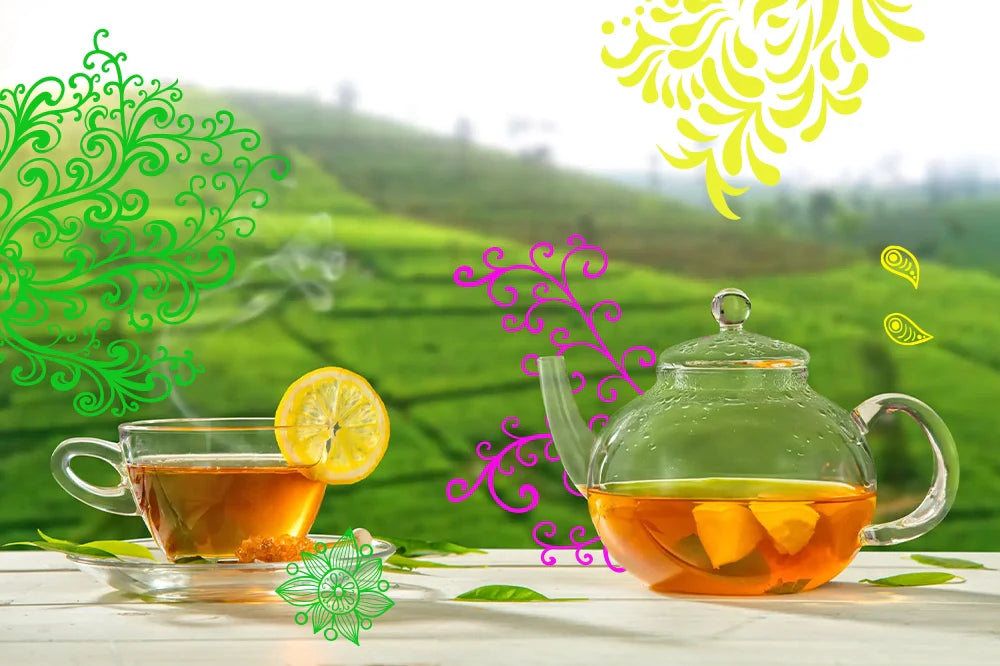
Is black tea healthy? Properties of black tea
Black tea is one of the most popular beverages in the world, prized for its deep, rich flavor and aroma. For many, drinking tea is a daily ritual. But have you ever wondered, is black tea healthy? What secrets do its dark leaves hold and how do they affect our health? In this article, we will take a closer look at the properties of black tea, its advantages and potential disadvantages.
What will you find in the article?
- A Brief History of Black Tea
- Fun fact: The same plant as green tea.
- Properties of black tea
- What does drinking black tea help with?
- Is black tea healthy? - Summary
- Possible side effects
- How much black tea can you drink per day?
- When not to drink black tea?
- Is it worth including black tea in your diet?
A Brief History of Black Tea – From China's National Drink to Global Popularity
The history of black tea is long and fascinating. It comes from China, where black tea was initially treated as a medicinal product., and later accompanied Buddhist monks in meditation, helping them maintain clarity of mind.
Black tea arrived in Europe in the 17th century, where it quickly won the hearts of the aristocracy, becoming a symbol of luxury. Its exclusive character was often immortalized in paintings, where wealthy aristocrats posed with precious porcelain cups, a sign of their high social status.
However, the real icon of this custom was the British Queen Victoria in the 19th century, who popularized the ritual of afternoon tea, the famous afternoon tea, making tea drinking an important part of social life and national identity. Today, this black tea infusion is accessible to everyone and is an important part of many cultures.
Fun fact: Black tea is made from the same plant as green tea.
The world of tea is a fascinating journey that, interestingly enough, begins with the same leaf buds or delicate stems – Camellia sinensisThe method of processing its leaves determines whether we obtain a refreshing green tea, full of grassy notes, or its sister – the deep and aromatic black tea.

Properties of black tea
Black tea is not only a tasty drink with an intense flavor, but also source of many valuable ingredients. Black tea contains compounds that have a real impact on our health. Its main health benefits stem from the presence of:
- flavonoids,
- tannins,
- essential oils,
- teiny
- and minerals, including manganese, potassium and fluorine.
Drinking black tea regularly can provide many benefits. Let's take a closer look at its most important properties.
Stimulant properties
Black tea is known for its theine content, which is widely known for its stimulating effects. This tea equivalent of caffeine It gently but effectively stimulates the central nervous system, which improves concentration, speeds up thought processes and reduces drowsiness. Importantly, theine is released much slower than caffeine from coffee, providing a long-lasting and balanced energy boost without the sudden effect of fatigue.
A cup of strong black tea has a stimulating effect, making it an ideal choice to start the day or during times of increased intellectual effort.
Antioxidant effect – tea in the fight against aging processes
Black tea is rich in antioxidants, primarily flavonoids and polyphenols. These valuable compounds neutralize free radicals, which are responsible for cell damage and accelerated aging. Regular tea consumption it supports natural defense mechanisms, protecting cells against oxidative stressIt's this antioxidant effect that makes tea healthy and helps maintain youthfulness. It's safe to say that black tea slows down the aging process.
Beneficial effect on the heart and blood vessels
Scientific research suggests that Regularly drinking black tea may have a beneficial effect on the cardiovascular systemThe flavonoids in tea help maintain healthy blood vessels, may regulate blood pressure, and lower bad cholesterol (LDL). drinking tea may reduce the risk of developing serious heart diseaseIncluding a few cups of tea in your daily diet is a simple way to support your heart.
Support for the digestive system
Black tea also has a positive effect on the digestive system. The tannins in the infusion have astringent properties and can help relieve stomach ailments such as diarrhea.Its infusion stimulates the secretion of digestive juices, which helps improve digestion. However, it's important to remember not to drink it on an empty stomach, as it may cause irritation.
What does drinking black tea help with?
Regularly drinking black tea is more than just a moment of pleasure; it supports our bodies on many levels. It can help with, among other things:
-
Fatigue and loss of concentration - theine stimulates the mind, facilitating concentration and adding energy in a natural way.
-
Digestive problems - can relieve mild diarrhea and indigestion thanks to the astringent effect of tannins.
-
High levels of "bad" cholesterol - flavonoids in tea help maintain normal LDL cholesterol levels in the blood.
-
Blood pressure fluctuations - regular drinking can help stabilize and slightly lower blood pressure.
-
Excessive stress - the tea drinking ritual itself combined with L-theanine has a relaxing effect - helps reduce nervous tension.
-
Weakened immunity - antioxidants support the immune system in the fight against infections and inflammation.
Is black tea healthy?
After analyzing the numerous benefits, the answer to the question of whether black tea is healthy seems obvious. Yes, black tea is healthy, provided it is consumed in moderation. This tea is rich in antioxidants and other bioactive compounds. It provides not only stimulation but also protection for cells. It's safe to say that black tea is healthy.
What are the possible side effects of drinking too much black tea?
While the health-promoting properties of black tea are undeniable, too much of anything is harmful to our bodies. If you overdo it, you may experience side effects such as:
- anxiety, nervousness and hand tremors,
- sleep problems,
- headaches and dizziness,
- increased blood pressure,
- stomach irritation and heartburn
- discoloration of teeth.
The key to reaping positive health benefits is moderation.
How much black tea can you drink per day?
A safe amount is considered to be 3 to 5 cups of tea per day. This amount allows you to enjoy its health-promoting properties without the risk of negative effects. It's important to observe your body's reaction to each serving of tea.
When not to drink black tea?
Although black tea provides a number of health benefits, it also has some disadvantages that we cannot ignore in our article.
The most important of them is the fact that the tannins it contains may limit the absorption of iron from plant foods. People with anemia should therefore avoid drinking black tea directly with meals.
Furthermore, excessive caffeine in the diet can lead to nervousness, sleep problems, and heart palpitations. It is not recommended for small children, pregnant or breastfeeding women.
Black tea it may also not be suitable for people with stomach ulcers, because its excess may have an irritating effect on the stomach.
Is it worth including black tea in your diet?
Definitely yes. Black tea is a beverage with extraordinary properties. Drinking it not only makes time more enjoyable but also actively supports our health. However, remember to drink in moderation and that black tea is not a medicinal product, and its impact on our health is part of a balanced diet and a healthy lifestyle. By choosing high-quality tea leaves, we can fully enjoy its wonderful flavor and valuable properties.







Leave a comment
This site is protected by hCaptcha and the hCaptcha Privacy Policy and Terms of Service apply.